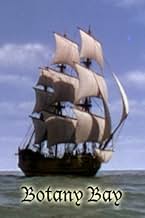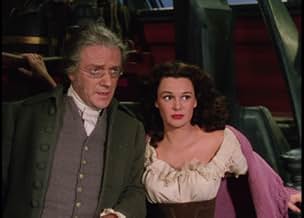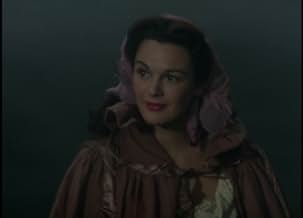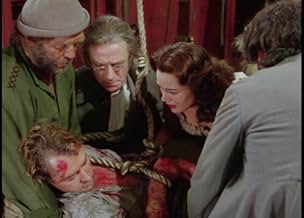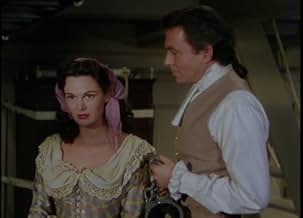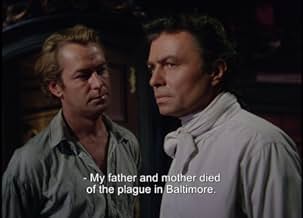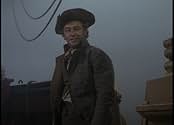CALIFICACIÓN DE IMDb
6.1/10
691
TU CALIFICACIÓN
Agrega una trama en tu idiomaIn 1787, American medical student Hugh Tallant and British convicts are sent from London to New South Wales on a ship commanded by the evil Captain Gilbert.In 1787, American medical student Hugh Tallant and British convicts are sent from London to New South Wales on a ship commanded by the evil Captain Gilbert.In 1787, American medical student Hugh Tallant and British convicts are sent from London to New South Wales on a ship commanded by the evil Captain Gilbert.
- Dirección
- Guionistas
- Elenco
Cedric Hardwicke
- Gov. Phillips
- (as Sir Cedric Hardwicke)
Anita Sharp-Bolster
- Moll Cudlip
- (as Anita Bolster)
Brandon Toomey
- Guard
- (as Brendan Toomey)
Patrick Aherne
- Bo's'n's Mate
- (sin créditos)
John Albright
- Sailor
- (sin créditos)
Walter Bacon
- Prisoner
- (sin créditos)
- Dirección
- Guionistas
- Todo el elenco y el equipo
- Producción, taquilla y más en IMDbPro
Opiniones destacadas
Other reviewers of Botany Bay have complained about the lack of location shooting in this film. Two very good reasons for Paramount's decision to opt for the back lot. First it was expensive to go to Australia for an American company. I'm sure that there are Aussie films that deal with this particular portion of their history far better than Botany Bay.
But secondly this was the last picture on Alan Ladd's Paramount contract. He and his agent/wife Sue Carol made a decision to move to Warner Brothers so Paramount was getting rid of the last film on his contract. They were not about to spend big bucks promoting a star who wasn't going to be bringing in more box office for them.
Having said that Botany Bay is not a bad film and it certainly did give American audiences some idea about the founding of Australia as a haven for convict prisoners. One of our original 13 colonies, Georgia, was founded for just that reason also, but here a whole continent was devoted to same.
Ladd plays an American accused of being a highwayman in Great Britain. The fact he was an American probably played some role in his conviction so shortly after the American Revolution in the 1780s. He's saved from the hangman by this offer of pardon to go to Australia and he travels on a crowded ship, skippered by a sadistic captain.
Who is played by James Mason who basically steals the film. The novel on which this is based is by Nordhoff and Hall who wrote Mutiny on the Bounty and there's a whole lot of Captain Bligh in Mason. We've also got Patricia Medina, a saucy wench who likes Ladd, but flirts with Mason for her survival on the ship in some comfort.
Not a bad film, but not the greatest of send offs for one of Paramount's biggest stars.
But secondly this was the last picture on Alan Ladd's Paramount contract. He and his agent/wife Sue Carol made a decision to move to Warner Brothers so Paramount was getting rid of the last film on his contract. They were not about to spend big bucks promoting a star who wasn't going to be bringing in more box office for them.
Having said that Botany Bay is not a bad film and it certainly did give American audiences some idea about the founding of Australia as a haven for convict prisoners. One of our original 13 colonies, Georgia, was founded for just that reason also, but here a whole continent was devoted to same.
Ladd plays an American accused of being a highwayman in Great Britain. The fact he was an American probably played some role in his conviction so shortly after the American Revolution in the 1780s. He's saved from the hangman by this offer of pardon to go to Australia and he travels on a crowded ship, skippered by a sadistic captain.
Who is played by James Mason who basically steals the film. The novel on which this is based is by Nordhoff and Hall who wrote Mutiny on the Bounty and there's a whole lot of Captain Bligh in Mason. We've also got Patricia Medina, a saucy wench who likes Ladd, but flirts with Mason for her survival on the ship in some comfort.
Not a bad film, but not the greatest of send offs for one of Paramount's biggest stars.
Here's another film about transporting prisoners to Australia in the 18th century. I can't comment on the accuracy of the history here but this is a subject that often gets used as the backdrop to films or TV series. It does allow scope for adventure, a bit of swashbuckling, usually a dose of brutality and often a pretty heroine. All are present here with Alan Ladd as a doctor wrongly accused of highway robbery, the beautiful and perhaps underrated Patricia Medina as the heroine, Sir Cedric Hardwicke as the governor at Botany Bay and best of all, James Mason as the brutal sea captain giving one of his most charismatic performances ever that I've seen and that's many. Mason simply steals every scene he's in and you can't take your eyes off him and he certainly gives. Charles Laughton a run for the money in Mutiny On The Bounty. I understand it was all shot on backlots at Paramount which can give a claustraphobic feel when it needed opening up with location work but even so passes a couple of hours fairly successfully.
A good premise: a gaggle of British convicts, male and female, are shipped to the new penal colony in Australia, circa 1780s. But while this story calls for great seascapes, Paramount gives us ship-in-a-soundstage scenes which are cramped and unconvincing. Even the later sequences in Australia have a "backlot" quality to them. Note the dark, sexually-ambiguous undertones in the performance of ship's captain, James Mason. Alan Ladd, who, like Burt Lancaster and Mel Gibson, liked to suffer in his movies, here gets to be flogged and later keelhauled. His flogging in "Two Years Before the Mast" is much more vivid but his keelhauling in "Botany Bay" marks the only time a Hollywood leading man has suffered this particular kind of punishment. Curiously, despite his penchant for "beefcake" scenes, Ladd remains fully clothed for this sequence. Perhaps the fear was that audiences would understandably expect a shirtless Ladd to suffer many cuts and abrasions on his bare torso while being scraped under the ship's keel, and Paramount didn't want to see its handsome leading man forced to look, even temporarily, disfigured or damaged.
Alan Ladd completed his Paramount contract with this blighted version of Nordhoff & Hall's 1941 novel which (since plague features in the plot) ironically had to be rescheduled around a nasty bout of 'flu that confined him to bed for several days during production.
Despite an interesting cast (with James Mason absolutely loathsome as the brutal captain, who later recalled he found director John Farrow's own cruelty on the set gave him "some useful hints"), rich Technicolor photography by veteran cameraman John Seitz, frequent floggings, a keelhauling and other unpleasantness, the studio-bound end result is surprisingly garrulous and uninvolving.
Despite an interesting cast (with James Mason absolutely loathsome as the brutal captain, who later recalled he found director John Farrow's own cruelty on the set gave him "some useful hints"), rich Technicolor photography by veteran cameraman John Seitz, frequent floggings, a keelhauling and other unpleasantness, the studio-bound end result is surprisingly garrulous and uninvolving.
Following the death of his parents from the plague, American "Tallant" (Alan Ladd) came back to the mother country only to get embroiled with a crooked inheritance agent and find himself found guilty of stealing his own cash! Transportation was the order of the day, so he is imprisoned in the ship of "Capt. Gilbert" (James Mason) and off they set on the eight month voyage to New South Wales. En route, it soon appears that "Gilbert" might have learned the arts of seamanship from Captain Bligh, so when the decent young "Tallant" falls in with the enigmatic "Sally" (Patricia Medina) he ends up earning the animosity of his host, and after a failed escape attempt is now a marked man. Even though he has a modicum of medical experience and the ship no surgeon, what chance he will make it half way around the world to put his case to the Governor (Sir Cedric Hardwicke)? Mason is on quite decent form as the menacingly jealous officer and Medina does well with a slightly demonic look in her eye but Ladd, he's as wooden as the mizen mast. He has the all-American football player looks, all right, but as an actor he has all the screen presence of a dead chipmunk. It's a predictably episodic adventure but whilst all are at sea it's quite good fun before an ending that is all a bit disappointingly rushed and which I felt rather let it all down. Still, there's plenty going on, even a keel-hauling, and plenty of folks get clunked on the head or shot or drowned, so it is worth a watch.
¿Sabías que…?
- Citas
Capt. Paul Gilbert: [after sentencing Hugh Tallant to a 50-lash whipping] I don't want any danger of infection. Have you the salt ready for his wounds?
- ConexionesFeatured in Never Fear Smith Is Here! (1994)
Selecciones populares
Inicia sesión para calificar y agrega a la lista de videos para obtener recomendaciones personalizadas
- How long is Botany Bay?Con tecnología de Alexa
Detalles
Taquilla
- Total en EE. UU. y Canadá
- USD 1,900,000
- Tiempo de ejecución
- 1h 33min(93 min)
- Color
- Relación de aspecto
- 1.37 : 1
Contribuir a esta página
Sugiere una edición o agrega el contenido que falta

